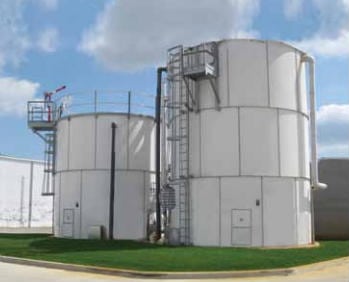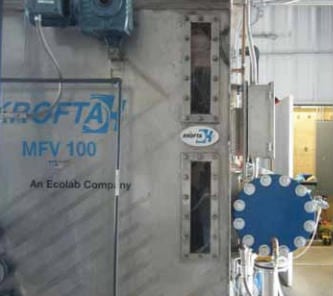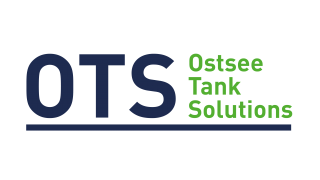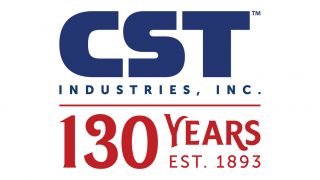John Fitz Simons has a job most kids (and adults) dream about. He is the Assistant Plant Manager at Ice Cream Specialties, Inc. in Lafayette, Ind., where millions of frozen treats ranging from ice cream bars and sandwiches, to fudge bars and pops, are manufactured every year for leading national brands.In order to produce the 18-21 million novelties distributed from the plant each year, Ice Cream Specialties runs up to 11 production lines and two repack lines for multipack and variety units. Because of the high fat content of ice cream, the company installed recovery systems for wastewater treatment many years ago to flush out vats and tanks into recovery tanks prior to discharge into the municipality’s water treatment system. But increases in production through the years have led to an increase in wastewater discharge, which included higher levels of total suspended solids (TSS) as well as biochemical oxygen demand (BOD) which exceeded discharge permit limits.
To arrive at a more manageable discharge, the company turned to its partner of more than 25 years – Ecolab. The Ecolab Water, Energy & Waste Solutions group delivers systems, chemical programs and services to customers in multiple industries, most notably the food & beverage processing market. Ecolab is a total solutions provider in wastewater treatment and renewable energy projects. Krofta Technologies, an Ecolab company, is a leader in high-performance dissolved air flotation (DAF) equipment as well as filtration, water and wastewater treatment systems.
As part of a pilot test, Krofta analyzed Ice Cream Specialties’ BOD and TSS average discharge amounts, as well as pH, fats, oils and grease (FOG). The company followed up with a recommended wastewater treatment (WWT) system proposal, which included influent flow equalization to optimize overall system efficiency and aeration for biological treatment
 to help remove excess BOD. When completed, the WWT system would consist of influent flow equalization, primary DAF, biological treatment, Moving Bed Biofilm Reactor (MBBR), secondary DAF, sludge storage and discharge.
to help remove excess BOD. When completed, the WWT system would consist of influent flow equalization, primary DAF, biological treatment, Moving Bed Biofilm Reactor (MBBR), secondary DAF, sludge storage and discharge.
Krofta led the design and build of the wastewater treatment plant additions, including the foundations. To expedite the build process, the company utilized local subcontractors that had previously completed a remodel at Ice Cream Specialties and were familiar with the facility.
The two key upgrades to the Ice Cream Specialties’ wastewater treatment system included the addition of two steel bolted storage tanks for the influent flow equalization and aeration processes. Because fatty acids from ice cream are very aggressive toward certain types of storage tanks and coatings (including concrete), the strength and durability of the tanks’ coatings were essential for long-term performance. In addition, the plant’s wastewater often experienced wide swings in pH throughout the day, especially if
Continued below
sherbet was being produced, adding to the importance of the chemical resistance and durability of the tanks’ coating. The system that Krofta recommended included excellent controls for caustic and acid to maintain and control proper pH levels.
The tanks chosen for the system upgrade were factory coated bolted steel design engineered and built by CST Storage, global leader in storage solutions with a complete product line of tanks and coatings used in water and wastewater applications.
The influent flow equalization tank was 18’ dia x 18’ tall with a capacity of 32,000 gallons usable complete with ladder, guardrails and nozzles, OptiBond™ interior coating and exterior color coating. The aeration tank was 15’ x 24’ open top tank with an embedded starter ring fastened to an aeration unit in the floor and capable of 33,700 gallons of usable capacity. Its features included a mixer and its support, ladder, platform, nozzles, OptiBond interior coating and exterior color coating.
The CST Storage bolted steel tanks were manufactured and shipped in panels. The panels received baked-on coatings at the factory through a unique OptiBond system, which ensured consistency and durability, and provided the benefit of less long-term maintenance and expensive future recoating. Once on site, the tanks were erected by crews using simple hardware and gaskets in less than one week, minimizing downtime for the entire system.
“One great benefit to choosing a bolted steel tank design was that installation was not halted by bad weather even though we installed the tanks in February. Because no field welding or painting was involved, the installation was not hampered by environmental conditions such as wind or snow,” said Mark Eklund, business development manager–wastewater market for CST Storage.
Today Ice Cream Specialties’ wastewater treatment facility discharges an average 45-55,000 gallons per
 day, while the maximum capacity for the system is 125,000 gallons per day. Because of anticipated increases in demand and productivity, Ice Cream Specialties had the foresight to oversize the water treatment system to accommodate future growth and increased capacity.
day, while the maximum capacity for the system is 125,000 gallons per day. Because of anticipated increases in demand and productivity, Ice Cream Specialties had the foresight to oversize the water treatment system to accommodate future growth and increased capacity.
While Ice Cream Specialties created a more manageable wastewater discharge for the local municipality, it also added other efficient water systems to its manufacturing facility. During a recent freezer expansion, the company added a one million gallon retention system beneath its parking lot. This allowed them to store and control pump stormwater runoff back into their local stream.
“We were very pleased with the work of Ecolab and CST Storage in developing a thorough long-term solution for our wastewater treatment system. It has been a great investment for our company. We were amazed at the consideration and planning that went into the tanks and controls, and have been pleased with how the influent flow equalization and aeration have optimized our wastewater treatment system,” said Fitz Simons.

